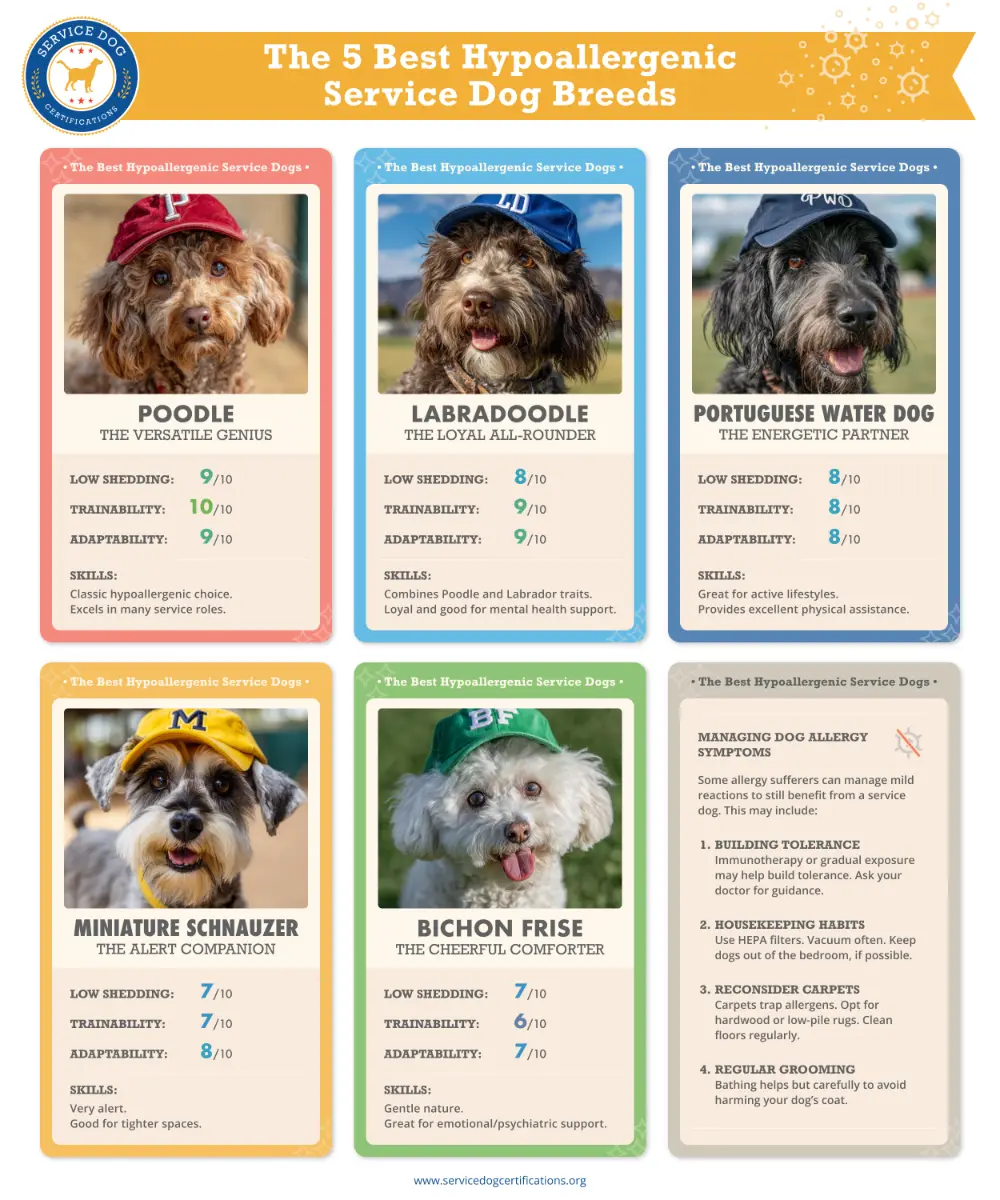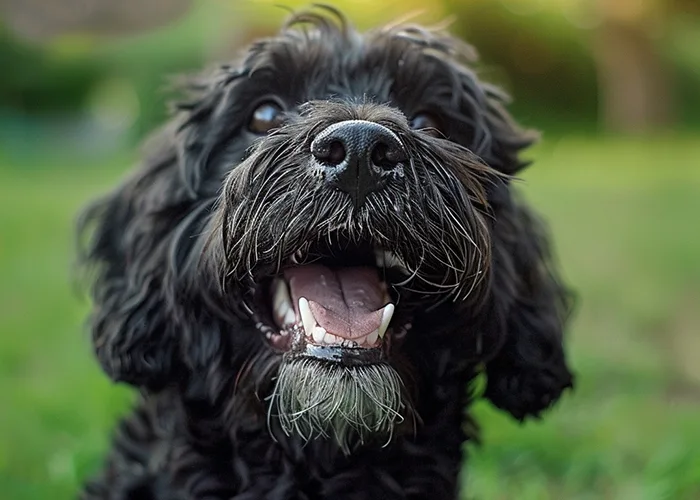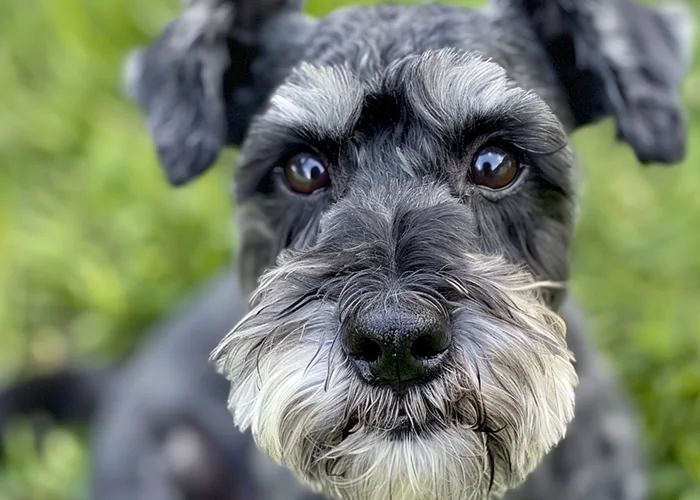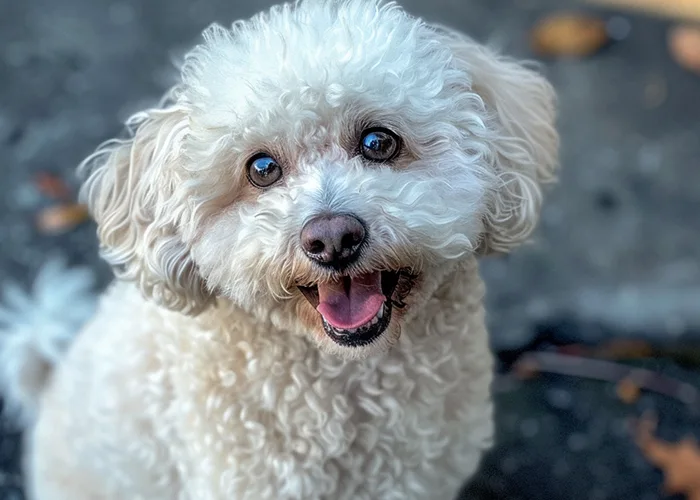The Best Hypoallergenic Service Dogs
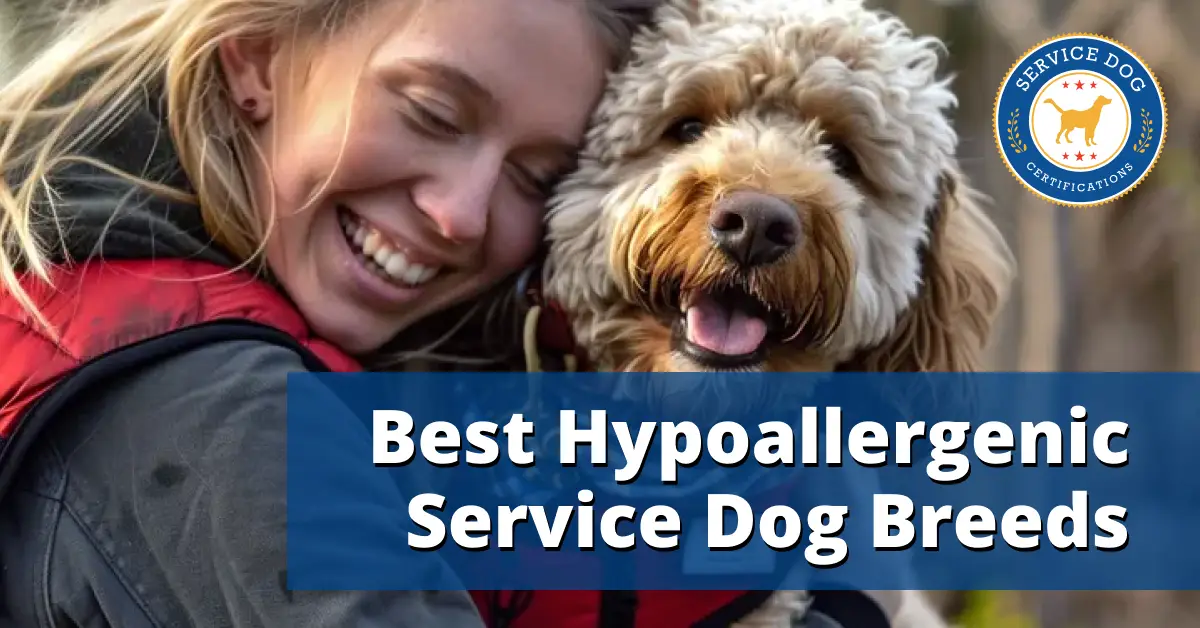
While no dog is truly hypoallergenic, there may be some breeds of dogs that are less triggering for your allergies than others due to their low shedding coats, which is essential to know if you need a service dog or a psychiatric service dog.
In recent years, the term “hypoallergenic” has been used to describe certain types of dogs. Considering that 10-20% of the population is allergic to dogs, it’s no surprise that this label has gained popularity. However, if you have been pinning all your hopes on finding a hypoallergenic service dog as the perfect solution, it’s important to understand the science behind the hype.
While some individual dogs may indeed elicit fewer allergy symptoms than others, studies suggest that no specific breed (or mix of breeds) is truly hypoallergenic.
One revealing study found no significant differences in the levels of the primary dog allergen in homes with dogs labeled as hypoallergenic compared with those that weren’t. The authors noted the need for more research to confirm these findings, but the results certainly challenge the common myth about hypoallergenic breeds.
Share this image on your site
In this article:
- Five service dog breeds that are better for allergies
- Managing dog allergy symptoms
- Finding the best service dog For your allergies
Five Service Dog Breeds That Are Better for Allergies
Some popular purebred dogs are frequently referred to as “hypoallergenic” because of their low-shedding attributes. These are 5 of the most popular service dog breeds for allergy sufferers:
1. Poodle
Poodles are often celebrated for their hypoallergenic coats, which shed minimally and produce less dander. Their intelligence and trainability make them exceptional service dogs. Due to their adaptability and quick learning abilities, poodles excel in various roles.
2. Labradoodle
Labradoodles are a crossbreed between a Labrador Retriever and a Poodle. They inherit the hypoallergenic coat of the Poodle while maintaining the Labrador’s friendly and loyal nature. This combination makes Labradoodles ideal for service work and mental health support.
3. Portuguese Water Dog
Portuguese Water Dogs are known for their curly, water-resistant coats, which are less likely to trigger allergies. Their high energy levels and loyalty make them excellent service dogs, particularly for individuals needing assistance with physical tasks or those who enjoy an active lifestyle.
4. Miniature Schnauzer
Miniature Schnauzers have a wiry, hypoallergenic coat that sheds minimally. Their alertness, trainability, and affectionate nature make them great candidates for service roles, especially in environments where a smaller dog is preferable.
5. Bichon Frise
Bichon Frises are small, hypoallergenic dogs with a cheerful disposition. Their gentle and sociable nature makes them excellent psychiatric service dogs, while their adaptability allows them to perform various service tasks effectively.
These breeds are often considered for service roles due to their intelligence, trainability, and temperament. However, it’s crucial to remember that there are no guarantees they will result in fewer allergy symptoms in all individuals. There may be less hair, but you can’t avoid their dander and saliva!
If you can, try spending as much time as possible around one of these dog breeds to see how severely your allergies are triggered by them. Each individual will respond differently to each dog, so it’s important to get firsthand experience.
Managing Dog Allergy Symptoms
For some allergy sufferers, their reaction to dog allergens is too severe to consider having a dog. For others, their need for a service dog can become a reality with careful management of allergies. Some minor sniffles and irritation can be significantly outweighed by the health necessities of a service dog.
Here are some tips for mitigating dog allergies:
1. Building Tolerance
Some dog owners claim they have built up a tolerance to allergens. Allergen immunotherapy shots may be an option for building up true tolerance. Ask your doctor or allergy specialist about whether treatment is right for you.
2. Housekeeping Habits
Good housekeeping habits can also help keep allergies at bay. Keep your service dog out of your bedroom if that is possible. That is, of course, difficult for many service dog owners who need their dog by their side 24-7.
Use a HEPA air filter and vacuum regularly, and consider wearing an N95 or other filtering mask while doing so. Invest in a vacuum cleaner with a certified asthma and allergy-friendly filter.
3. Consider Carpet
Hardwood floors are a popular option in homes these days, and one study found that homes with carpets had higher levels of dog allergens than those with hardwood floors. If you prefer to keep carpets in your home, consider opting for low-pile carpets and steam cleaning and vacuuming them regularly.
4. Regular Grooming
Some people opt to bathe their service dogs more frequently. However, this might not significantly reduce symptoms, and over-bathing could strip the dog’s coat of valuable oils. Ask your veterinarian how frequently you can bathe your dog without harming its coat and skin health.
Finding the Best Service Dog For Your Allergies
While no dog breed is entirely hypoallergenic, certain breeds are less likely to trigger allergic reactions due to their coat characteristics, shedding patterns, and ability to trap dander. Understanding the science behind dog allergies and hypoallergenic traits can help individuals make informed decisions when selecting a service dog.
Combining the right breed choice with effective allergy management strategies can significantly enhance the quality of life for those who need service dogs but suffer from allergies.
About the Author: The writing team at Service Dog Certifications is made up of folks who really know their stuff when it comes to disability laws and assistance animals. Many of our writers and editors have service dogs themselves and share insights from their own experiences. All of us have a passion for disability rights and animals.
Related Articles

Do Border Collies Make Good Service Dogs?
When choosing a service dog, whether it be for physical or psychiatric disability, it has to be “need over breed.” Let’s face it, you may love the Chihuahua breed, but when it comes to aiding you with specific tasks, this little guy may not be up for the job. Do Border Collies make good service […]

Read More

Can a Yorkie Be a Service Dog?
The Yorkshire Terrier is a big dog in a small package. With his silky coat and traditional “topknot,” the Yorkie is sure to attract attention wherever he goes. And because of his pint-size, this dog often travels in style – in designer doggy purses or special totes made just for those “elite” pooches. The Yorkie […]

Read More

Can a Maltese Be a Service Dog?
Who can resist the snow white coat, dancing eyes, and spunky nature of the Maltese? This cute, spritely little pooch excels at many things like agility, tracking, obedience, and rally. Can a Maltese be a Service Dog? If so, you would be able to go anywhere you go with your Maltese! Read on as we […]

Read More
